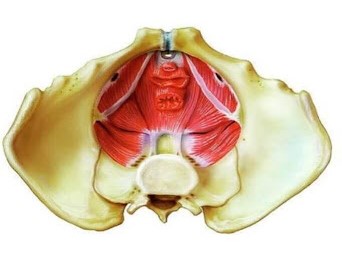How Pelvic Floor Physiotherapy Can Help You During AND After Pregnancy!


Michelle DeMarchi
BSc PT, DOMP
Physiotherapist, Pelvic Health Physiotherapist, Bracing Specialist
What if I told you there was a simple and scientifically proven solution to reduce pregnancy-related pain and prepare your body for easier delivery of your baby?
What if I told you that this same solution can help to strengthen your pelvic floor, restore your core, fix urinary and stool leakage, and get you back to doing your regular activities AFTER your pregnancy?
All of this might sound too good to be true, but Pelvic Floor Physiotherapy has helped THOUSANDS of expecting parents have a more comfortable pregnancy and bounce back to their regular selves after giving birth!
What Is the Pelvic Floor?
You can picture the pelvic floor as a group of muscles that run from your tailbone to your pubic bone.
These muscles act like a hammock to support your pelvic organs, which include your bladder, uterus or prostate, and rectum.
These important pelvic floor muscles help control your bladder, bowels, and play a role in sexual function.
In addition, your pelvic floor muscles work together with your lower back, abdominal, and breathing muscles to control the pressure inside your body and support your spine.

As you’re probably well aware of, being pregnant results in many changes to the body.
Pregnancy and giving birth stretch the muscles of your pelvic floor and might change the way they function, which can result in your pelvic floor not working properly.
As a result, you can be experiencing uncomfortable symptoms like low back pain, pain with intercourse, urinary and stool leakage, and more.
However, you’ll be relieved to know that Pelvic Floor Physiotherapy can absolutely treat these pelvic floor-related symptoms!
What Is Pelvic Floor Physiotherapy?
Ten years ago, you didn’t hear many people talking about Pelvic Floor Physiotherapy.
Fortunately, Pelvic Floor Physiotherapy has become a less taboo subject as people have realized the importance of talking about conditions related to your pelvic floor, which is also known as pelvic floor dysfunction.
Pelvic Floor Physiotherapy is a specialized branch of physiotherapy treatment that involves treating and improving the function of your pelvic floor and core.
See below for the many conditions that Pelvic Floor Physiotherapists are trained to treat.
- Bladder leakage
- Overactive bladder
- Pain with intercourse
- Chronic constipation
- Bowel incontinence
- Diastasis recti
- Endometriosis
- Irritable bowel syndrome
- Pelvic organ prolapse
- Persistent pelvic pain
- Low back, hip, and tailbone pain
- Heaviness or discomfort around your pelvic region
Pelvic Floor Physiotherapists are experts in assessing the pelvic floor and creating an effective plan to treat pelvic floor conditions.
They’re trained in the following treatments to target and fix your pelvic floor problem:
- Pelvic floor strengthening
- Stretching of the pelvic floor
- Pelvic floor muscle retraining
- Soft tissue massage
- Trigger point release
- Postural correction
- Breathing and mindfulness exercises
- Education about your pelvic floor issue
- Electrical stimulation or TENS

How Can Pelvic Floor Physiotherapy Help Me During Pregnancy?
Pregnancy physiotherapy, also known as prenatal pelvic floor physiotherapy, focuses on RELIEVING PAINS in your body related to pregnancy and PREPARING YOUR BODY for the delivery of your baby!
Reduce Pain During Pregnancy
During your pregnancy, there’s an increased amount of stress placed on your pelvic floor as your body shifts to accommodate your baby.
A Pelvic Floor Physiotherapist can help strengthen your pelvic floor, stretch your pelvic floor muscles, and ensure that you have proper posture.
Addressing these issues can help reduce any pelvic-related and low back pain associated with your pregnancy.
Fix Bladder Leakage
Contrary to popular belief, leaking urine during pregnancy is something that’s NOT normal.
Urinary leakage is a common condition in people who are pregnant that CAN be fixed!
You can experience urinary leakage when you sneeze, cough, run, or do any other activity that increases the pressure in your pelvic floor.
You might also be experiencing the type of urinary leakage that makes it hard for you to hold your bladder and make it to the bathroom in time.
Pelvic Floor Physiotherapy can help with retraining your pelvic floor muscles so that urinary leakage is one less thing you have to worry about during your busy pregnancy.
Prepare Your Body for Delivery
Pelvic Floor Physiotherapy can help facilitate smoother labour and delivery. Preparing your pelvic floor structures can also decrease your chances of tearing while giving birth.
To do this, your Pelvic Floor Physiotherapist will coach you on different birthing positions that might be the most comfortable for you.
They’ll also focus on stretching your pelvic floor muscles and working on perineal massage to loosen structures around your pelvic floor in preparation for delivery.
Finally, they’ll educate you on different ways to help reduce discomfort during labour and instruct you on how to push when you’re delivering your baby.

How Can Pelvic Floor Physiotherapy Help Me After Pregnancy?
Postpartum physiotherapy focuses on RESTORING YOUR BODY after a major event like giving birth.
Oftentimes, the muscles of your pelvic floor are stretched, strained, or torn during this process. Those who’ve had a C-section can also have pelvic floor-related symptoms related to the incision made in the abdominal muscle.
This stress on the muscles in your body can lead to issues down the road like urinary incontinence, pain during intercourse, pelvic organ prolapse, separation in your abdominal muscles, and lower back pain.
Six weeks is usually the time it takes for your body to be ready for Pelvic Floor Physiotherapy after labour. Check with your doctor to know when you’re ready to start Pelvic Floor Physiotherapy and rehabilitate your pelvic floor!
Strengthen Your Pelvic Floor
Your Pelvic Floor Physiotherapist will ask questions to determine which activities are the most important for you to get back to.
They’ll provide you with different exercises to strengthen your pelvic floor and help you get back to your regular work, activities, and hobbies…as soon as possible!
Resolve Pain During Intercourse
Your pain during intercourse can be the result of many reasons.
However, this is often the result of scar tissue and increased sensitivity of your pelvic floor after the trauma of giving birth.
A Pelvic Floor Physiotherapist can treat this by using scar massage techniques to help break down scar tissue and desensitize any painful areas.
Restore Your Core Strength
After giving birth, you might notice a bulge in your belly that wasn’t there before.
This condition is known as diastasis recti, which happens when your core muscle is overly stretched during pregnancy and doesn’t completely come back together after you’ve given birth.
Diastasis recti affects 60% of people who’ve given birth, and 40% of those people still have it six months postpartum.
Although this condition isn’t painful, it can create weakness in your core and lead to other uncomfortable pelvic symptoms.
Your Pelvic Floor Therapist may work together with a certified pilates instructor to guide you through core and pelvic floor exercises to help restore the stability in your core and reduce the separation or bulge that you see in your stomach.
Our Pilates instructors are trained specifically in pelvic floor rehabilitation to help your body move better and recover quicker!
In addition to core exercises, your Pelvic Floor Physiotherapist will provide you with education on what activities you should avoid, discuss bracing techniques with you, and use other treatments like electrical stimulation to help reduce your diastasis recti.
I’m Ready to Set Myself Up for a Comfortable Pregnancy and Post-Partum Life!
Pelvic Floor Physiotherapy can be the key to setting yourself up for a successful pregnancy, delivery, and postpartum life.
Book now or Try a FREE 20-MINUTE PHONE CONSULTATION with one of our trained Pelvic Floor Physiotherapists who’ll be happy to discuss your pelvic floor concerns and review your treatment options.
You can also book your Pilates sessions with one of our Pilates instructors Pari and Monica. They can help you strengthen your core and help you feel confident in your body!
It’s time for you to prioritize your health during this journey to welcome a little one to your life. We’re here to help you feel healthy and confident, and be your best self every step of the way.
This blog was written by Anna Zheng, a Physiotherapy Resident

Frequently Asked Questions
Is an internal pelvic exam safe during pregnancy?
Yes, Pelvic Floor Physiotherapists have gone through extensive training to ensure that you and the baby are protected during any assessment. Your Pelvic Floor Physiotherapist will communicate everything that’s happening during the session to you to ensure that you’re comfortable and well-informed during every session.
Can I still benefit from Pelvic Floor Physiotherapy if I’ve had a C-section?
It’s still a good idea to see a Pelvic Floor Physiotherapist if you’ve had a C-section. No matter what method you delivered your baby, carrying a baby for nine months still impacts your pelvic floor. In addition, the incision into your stomach scar and also cause issues and discomfort in your stomach, back, and pelvic area. Pelvic Floor Physiotherapy can help address all of these issues and restore the function in your body.
Does Pelvic Floor Physiotherapy count as physiotherapy for my insurance?
Absolutely! If your insurance provider covers physiotherapy, then it’s likely that Pelvic Floor Physiotherapy fits within this coverage. Please contact your insurance provider if you have further questions.
